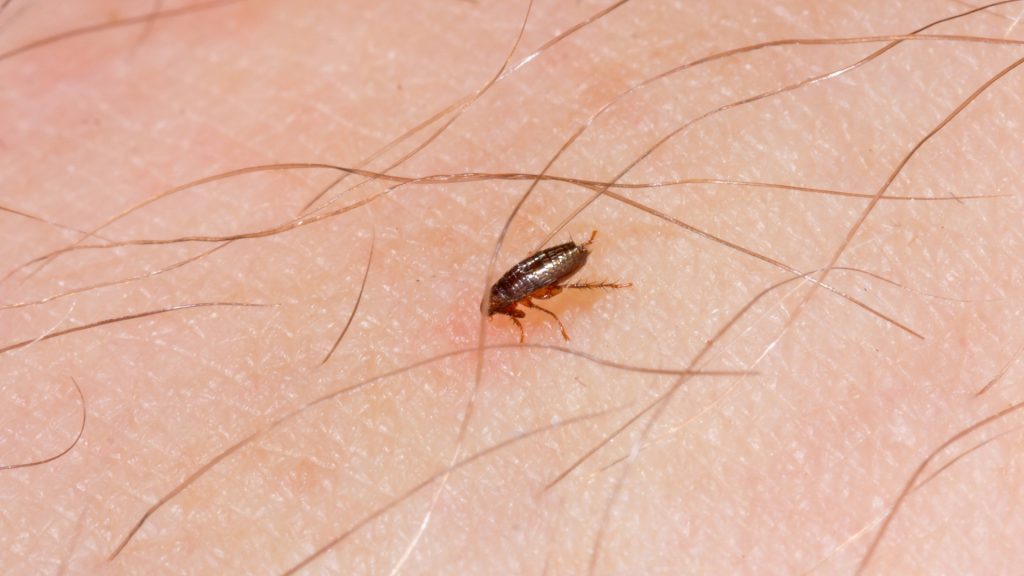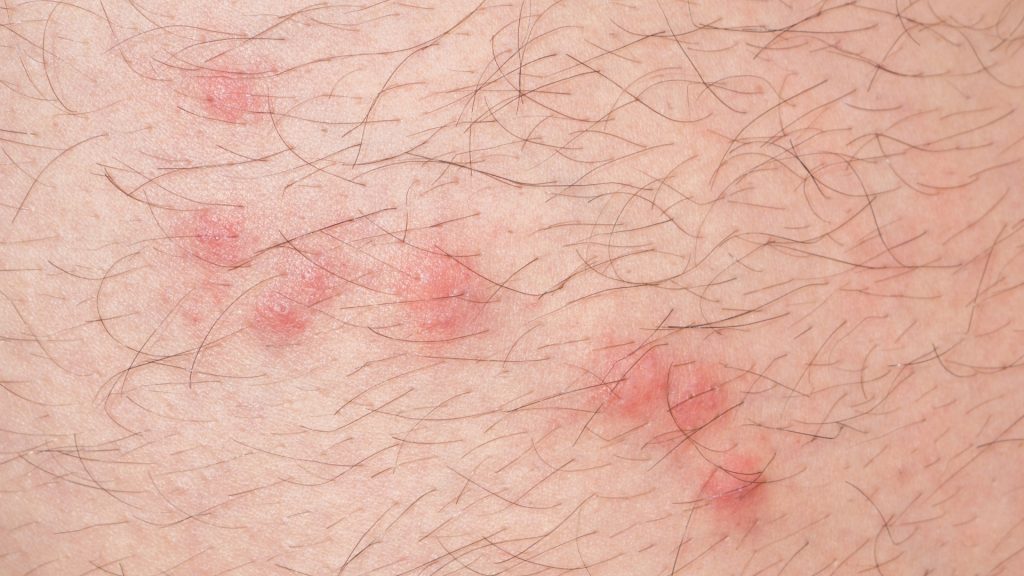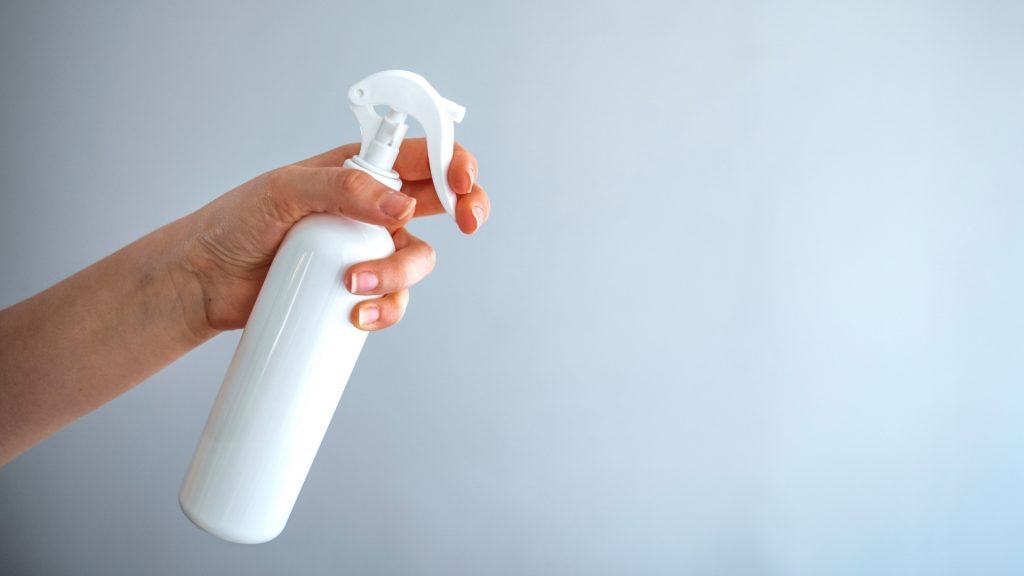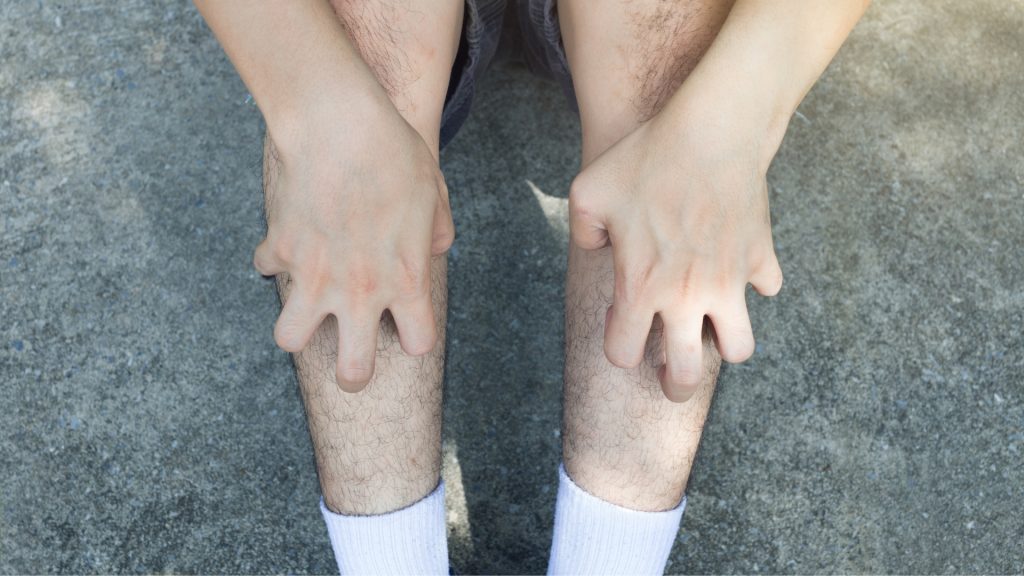You hate fleas when they bite your cat or dog, especially when they start biting you and your family. Fleas are nasty little pests with itchy bites that can carry a bunch of dangerous diseases. So when you discover flea bites, you want the fleas gone for good.
Quick‑Start Checklist
Look for 2–3 small red welts in a line on ankles or lower legs.
Vacuum daily and wash bedding in hot water (≥130°F) for at least two weeks.
Treat pets with a veterinarian‑recommended monthly flea preventative.
Use an anti‑flea spray or powder in the home and monitor for re‑infestation.
Apply over‑the‑counter itch‑relief creams (hydrocortisone 1% 2–3×/day) if needed.
Seek medical help if you develop severe swelling, difficulty breathing, or signs of infection.
How to identify and treat flea bites on humans? Hungry fleas will bite humans, but they’d much prefer to feed off furry mammals. You can tell the difference between flea bites and other types of bites by how they look and how itchy and painful they get. The best way to treat flea bites is to treat the flea infestation until your home is flea‑free and to use some medications to make flea bites stop itching.
This article will teach you more about fleas and provide you pointers that’ll help with the itching and products that will help ensure your flea problem is resolved once and for all. If you want to fix your flea issues, read on!
Do Fleas Bite Humans?

Given a choice, most fleas would prefer a meal from your pet. But when they’re hungry, they’ll go for any warm‑blooded creature in their vicinity. Since humans are warm‑blooded, they will bite us when hungry, treating us as a temporary food source.
Fleas cannot stay on our bodies for long. They lay eggs in the fur or feathers of mammals and birds, allowing the next generation to develop. Humans have neither fur nor feathers and hence no place where a flea can lay its head – or its eggs!
Which Part of the Body Do Fleas Bite the Most?
We most often find flea bites on our lower legs. Fleas can jump up to 200 times their height or about as far as our lower calf. They’ll also bite at the gap around our waistband and jump or climb to any skin they can reach.
If your infant or toddler plays on a flea‑infested floor, you may find clusters of two or three flea bites in the area around your baby’s knees or ankles.
Type of Fleas That Bite Humans
The flea most commonly encountered by pest controllers is the cat flea (Ctenocephalides felis). It not only lives on cats, but it’s also the most common flea found on dogs and other pets in the United States.
The dog flea (C.canis) isn’t as commonly found on dogs in the United States but has been found on wolves, foxes, and coyotes. Dog fleas have been linked to the transmission of the tapeworm Dipylidium caninum to humans from infected dogs and cats.
The ground squirrel flea (Oropsylla montana) is most commonly found in California and the southwestern United States. Researchers have linked them to cases of bubonic plague.
The oriental rat flea (Xenopsylla cheopis) may be the world’s deadliest insect. Oriental rat fleas spread the Black Death throughout medieval Eurasia and today spreads typhus throughout the developing world.
Why Do Fleas Bite Humans?
Fleas only bite humans for one reason: food. They need a steady diet of blood, and they typically find that meal by boarding on a furry mammal like a dog or cat. Once they hop on, a flea typically stays on its new dog or cat home for the rest of its life, jumping off only to lay eggs in the animal’s bedding or on a carpet.
But as those fleas keep laying eggs, the environment becomes increasingly crowded with fleas. Those who can’t find a home on a furred mammal must grab a meal wherever they can find one. And so, they resort to eating human blood until better food becomes available.
What Do Flea Bites Look Like on Humans?

Fleas most commonly travel from pets to humans. If you’re noticing itchy, red welts on your ankles and lower leg or seeing specks on your sheets or socks, your home is likely infested with fleas. Typical flea bites appear as 2–3 small red bumps arranged in a linear cluster or “breakfast‑line” pattern on the lower legs or ankles.
What Do Flea Bites Look Like on Dogs?
If you notice scabs on your dog’s skin, particularly around their neck or the base of their tail, there’s a good chance they have fleas. You may see adult fleas crawling on your pet. You may also find tiny blackish‑rust colored bits of dandruff which are flea droppings.
How To Treat Flea Bites?

The only effective treatment for flea bites is to get rid of the fleas that are biting. Treat your house with an anti‑flea spray like the SENTRY HOME Household Flea and Tick Spray, and if necessary, take your pets to the veterinarian for an anti‑flea treatment. These steps should take care of the flea problem in your home and end your flea bite worries.
Step‑by‑Step Eradication Timeline
Day 1–2: Inspect all sleeping areas, pet bedding, and carpets. Vacuum every floor surface, paying special attention to seams and edges. Immediately seal and discard the vacuum bag.
Day 3–5: Wash all bedding, curtains, and removable fabrics in hot water (≥130°F) and dry on high heat.
Day 6–7: Apply a veterinarian‑recommended monthly flea preventative to each pet (topical or oral). Follow product label for dosage (e.g., 1 mL per 5 lb of body weight).
\li>Day 8–10: Treat the home with an EPA‑registered anti‑flea spray or powder, focusing on cracks, baseboards, and pet‑frequent zones. Re‑vacuum after the spray dries.
Week 2–4: Continue daily vacuuming and spot‑treat any new fleas. Re‑apply the home spray if you notice activity.
Week 5+: Monitor for re‑infestation. Maintain monthly pet preventatives and keep the home clean.
- LONG LASTING PROTECTION: SENTRY Household Flea and Tick Spray...
- PROTECT YOUR HOME: Spraying SENTRY HOME Flea and Tick Spray on...
- EFFECTIVE AGAINST PESTS: SENTRY Home Spray kills fleas, flea...
- FLEAS: Fleas are insects that can start your pet scratching with...
- TICKS: Ticks are parasites that belong to the arachnid family...
Related: Do Insect Repellents Work on Fleas and Ticks?
How Long Do Flea Bites Last?
Flea bites can be miserable, but thankfully they heal quickly. Your itchy bite should be back to normal within a day or two, but if you had an allergic reaction to it or if it became infected, you may need as long as a week or two before you fully heal.
How To Make Flea Bites Stop Itching? | Best Products
Here are the best medications to make flea bites stop itching that you can get over the counter. If you’re still suffering from your flea bites despite these efforts, you should seek medical advice.
Important: Before using the following products, it’s recommended to consult with your doctor.
Antihistamines for flea bites. You may find an oral antihistamine like the Benadryl Ultratabs Antihistamine helps reduce itching and lessen hives or other allergic reactions. Antihistamines reduce the production of histamines, chemicals that cause swelling and itching. Typical dosage: 25 mg every 4–6 hours, not to exceed 150 mg per day.
No products found.
Antibacterial ointment for flea bites. If your flea bites are still itching a few days after you noticed them, you may have picked up a secondary infection. An antibacterial cream like the GoodSense Maximum Strength Triple Antibiotic Ointment will help fight off the bacteria and soothe your misery. Apply a thin layer 2–3 times daily for up to 7 days.
- Triple Antibiotic Protection: Combines bacitracin zinc, neomycin...
- Maximum Strength: Formulated for maximum strength protection and...
- First Aid Essential: Ideal for treating minor cuts, scrapes, and...
- Common Uses: Provides protection and pain relief for minor cuts...
- Instructions: See product label for full usage instructions. Use...
Topical corticosteroids for flea bites. Hydrocortisone 1% cream is a leading anti‑itch medication. By calming your body’s immune reaction, corticosteroids like the Cortizone‑10 Maximum Strength decrease the itching, pain, and swelling of your flea bites. Apply 2–3 times daily to the affected area for up to 5 days.
- CONTAINS: (1) 1-oz. tube of Cortizone 10 Maximum Strength Cream...
- FAST RELIEF: This anti-itch cream with aloe relieves itching fast...
- SOOTHING ALOE VERA: Maximum Strength Cortizone 10 is formulated...
- STOP THE ITCHSANITY: Cortizone 10 Maximum Strength Anti-Itch...
- RELIEVES ITCH: Cortizone 10 With Aloe is great for relieving itch...
Allergic Reaction to Flea Bites
Those repeatedly bitten by fleas or other insects can become hypersensitive to their saliva. They may break out in hives or even become short of breath. The maddening itch leads to scratching, which can introduce bacteria into the open wounds.
When to Seek Medical Help
Severe swelling that spreads rapidly.
Difficulty breathing or wheezing.
Signs of infection: increasing redness, warmth, pus, or fever.
Persistent itching despite treatment (more than 7 days).
If any of these occur, contact a healthcare professional promptly.
Do Flea Bites Itch?

Flea bites can itch intensely, but you should do your best to avoid scratching them. Use the remedies provided above to help alleviate the itching. Before long, your bites will heal, and you’ll be glad you didn’t prolong the affair with unnecessary scratching.
Can Flea Bites Make You Sick?
If you get preyed upon by enough hungry fleas, their bites can become severe. Fleas can carry some pretty nasty diseases, including bubonic plague. Secondary infections caused by intense scratching may require medical attention or lead to scarring. But most flea bites are unpleasant and itchy but ultimately harmless.
Flea‑Borne Diseases
Bubonic Plague: Caused by Yersinia pestis. Symptoms include fever, chills, swollen lymph nodes (buboes), and sudden onset of severe illness. Prompt antibiotic treatment is essential.
Typhus (Murine Typhus): Transmitted by the oriental rat flea. Symptoms are fever, headache, rash, and body aches. Treated with doxycycline.
Tapeworm (Dipylidium caninum): Humans, especially children, can ingest infected flea larvae. Symptoms may include mild abdominal discomfort and visible segments around the anus. Treated with a single dose of praziquantel.
Prevention of Fleas on Pets
Keeping your pets flea‑free is the cornerstone of a flea‑free home. Follow these simple steps:
Apply a veterinarian‑recommended monthly topical or oral flea preventative (e.g., fipronil, selamectin, or nitenpyram).
Regularly bathe and comb your pet with a flea comb to remove adult fleas and eggs.
Wash pet bedding, blankets, and toys in hot water weekly.
Inspect your yard for wildlife (rabbits, squirrels) that can harbor fleas and treat the area if needed.
Home Remedies for Flea Bites
After you first notice fleas in your house, vacuum every day for two or three weeks. It’ll sweep up any flea eggs which may be on the ground. Empty the contents of your vacuum cleaner into a bag you can seal, then remove it from the house, so the fleas don’t find their way back.
Pour one cup of oatmeal and one cup of baking soda into a sock, then tie the sock shut. Soak it in a bathtub, squeezing the sock regularly to get as much oatmeal and baking soda goodness in the water as you can. Oatmeal and baking soda bath will not only help soothe the itching of flea bites, but it’ll also cleanse and soothe the skin.
Related: Do Glue Traps Work for Fleas? | Crucial Tactics and Best Practices
How To Identify Flea Bites and Other Types of Bites | Bite Differences
Here are some ways to determine whether those unexplained bumps on your skin come from fleas or a different source:
Bite TypeAppearanceCommon LocationOnset TimeFlea2–3 small red welts in a line ankles, lower legs, waistlineseconds–minutesBed BugClustered, often in a row, may have a dark spotMattress seams, headboardhours–daysMosquitoRound, raised, often with a central punctumExposed skin (arms, legs)minutesChiggerRed papule, often with a haloWaistband, groin, armpitsminutes–hoursScabiesBurrow‑like lines, intense itching at nightBetween fingers, wrists, elbowsDays–weeksAntRaised, painful welt, sometimes with a white tipAnywhere, often feetseconds
Bed Bug Bites vs. Flea Bites
Bed bugs hide during the day and come out at night to feed. A hungry flea will eat whenever and wherever it gets the chance. And while they’re more likely to be found on your pet’s bed, bed bugs prefer human blood and will nest in or as close to your mattress as they can.
Related: How to Treat Bed Bug Bites and Prevent Them
Flea Bites vs. Mosquito Bites
Both mosquito bites and flea bites look like small red swollen spots. But flea bites are typically found in a trail around the feet and shins, while mosquito bites will be found on any exposed skin. Flea bites begin itching intensely within seconds. On the other hand, numbing agents in mosquito saliva mean you won’t notice that bite for a few minutes.
Related: Do Mosquito Bracelets Work?
Chigger Bites vs. Flea Bites
Chiggers can be found in damp, grassy areas or shady berry patches. But you should bring a magnifying glass because they’re tiny. An adult chigger is around 1/60th of an inch (0.04 cm) long. A bloated adult flea can get as much as 1/10 to 1/8 of an inch (0.25 to 0.32 cm) long.
Additionally, chiggers like to hide in tight places like waistbands, elbows, and skin folds. There they attach to their meal and spend the next four days draining blood. When they finally let go, they leave behind an intensely itchy pimple. A flea bite is slightly larger than a chigger bite and a bit less likely to become blistered.
Related: Chigger Bite Treatment (Relief), Chigger Control and Prevention Guide
Flea Bites vs. Scabies
A microscopic mite called Sarcoptes scabiei causes the disease known as scabies. The scabies mite burrows beneath the upper layer of human skin. It feeds on blood and lays eggs as it tunnels, leaving in its wake a rash and intense itching, which gets worse at night. Scabies is more intensely uncomfortable than flea bites and more likely to blister.
Flea Bites vs. Ant Bites
If it feels like somebody just jabbed you with a hot needle, you’ve probably run afoul of a fire ant (Solenopsis invicta). Fire ant stings leave raised itchy welts that may superficially resemble a flea bite. But the burning pain of a fire ant sting is considerably worse than the discomfort of a flea bite.
Related: Ant Bites: Identification, Treatment, Allergic Reactions & More
Flea Bites vs. Chicken Pox
Both flea bites and chicken pox feature small, itchy raised red welts. You can alleviate the itching from flea bites and chicken pox with cool baths, calamine lotion, and oral or topical Benadryl. But chicken pox spots will spread all over the body. Most flea bites will be limited to one area that won’t spread.
Flea or Mite Bites
If you sit down in infected straw, hay, or leaf piles, you may be bitten by itch mites. (Pyemotes spp). You won’t notice the bite at first since they’re so tiny. But later, you may develop an itchy red skin rash.
Frequently Asked Questions
Do flea bites itch? Yes. Flea bites usually cause immediate, intense itching that can last several days.
How long do flea bites last? Most resolve within 1–2 days. If an allergic reaction occurs, healing may take 1–2 weeks.
Can I get a disease from a flea bite? While rare, fleas can transmit plague, typhus, and tapeworms. Prompt treatment reduces risk.
How often should I vacuum to control fleas? Vacuum daily for at least three weeks, then twice weekly for another month.
Are over‑the‑counter creams safe for children? Most are, but always follow age‑specific dosing instructions and consult a pediatrician.
Summary
Fleas are nasty, disease‑riddled creatures. But they’re easy enough to control, and once you get them off your pet and out of your home, you should be flea‑free for a good while. If you have a flea bite, oatmeal and baking soda bath should help soothe the itching.
May you and your pet remain flea‑free for a long time to come!
Related: Does the Dryer Kill Fleas?
List of Sources
Centers for Disease Control and Prevention. (2020). Common fleas of the United States.
Potter, M.F. (2018). Flea Control and Prevention. University of Kentucky College of Agriculture.
Merchant, M., Robinson, J. Controlling Fleas. Texas A&M Agrilife Extension.
Houseman, R.M. Fleas. University of Missouri Extension.
Richman, D. L., Koehler, P. G. Fleas – What They Are, What To Do. University of Florida.
Dryden, M.W., Payne, P., Zurek, L. (2003). Fleas Infesting Pets & Homes: Pests that Affect Human Health. Kansas State University.
- How to Get Rid of Copperheads | Practical Guide - August 27, 2023
- How to Get Rid of Corn Snakes | What Makes Them Aggressive? - August 27, 2023
- How to Get Rid of Alligators | Safety Measures and Removal Methods - July 16, 2023



